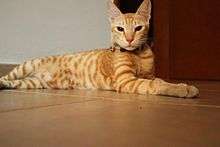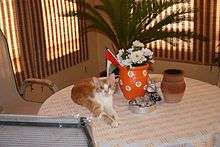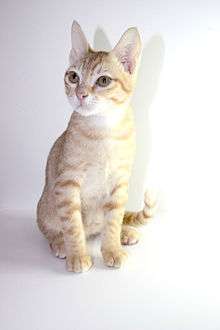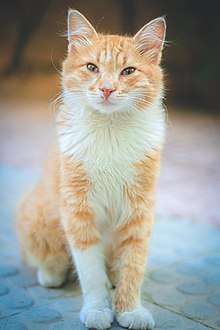Arabian Mau
The Arabian Mau is a formal breed of domestic cat, originated from the desert cat, a short-haired landrace native to the desert of the Arabian Peninsula. It lives in the streets and deserts of the Arabian Peninsula and has adapted very well to its extreme climate. The Arabian Mau is recognized as a formal breed by few fancier and breeder organization and cat registry, World Cat Federation (WCF) and Emirates Feline Federation (EFF). Based on one landrace, the Arabian Mau is a natural breed.
| Arabian Mau | |
|---|---|
 Red Tabby Arabian Mau | |
| Origin | Arabia |
| Breed standards | |
| WCF | standard |
| Domestic cat (Felis catus) | |
It is medium in size, with a body structure that is rather large and firm, not particularly slender, and with well-developed musculature. The legs are comparatively long, with oval paws.
The head appears round but is slightly longer than broad. The nose is slightly concave curved when viewed in profile. The whisker pads are clearly pronounced, with a slight pinch. The chin is very firm. The eyes are slightly oval, large and slightly slanted. The cat may have any normal cat eye color. There is no relation between the eye and coat colors. Usually, Arabian Maus have bright green eyes. The ears are large, slightly forward and sideward-placed, a little long, and high-set on the skull.[1]
The tail is generally of medium length and tapers slightly towards the tip.
The coat is short and lies close to the body. It has no undercoat and is firm to touch. It may not be silky but is noticeably very glossy.

History
The desert cat has been a landrace native to the Arabian peninsula in countries such as Saudi Arabia, Kuwait, Qatar, Oman, and the United Arab Emirates for more than 1,000 years.[2] Desert cats are well adapted to the hot, Middle Eastern environment.[2]

Temperament
Generally, Arabian Mau cats have very loving temperaments. The main feature of this cat breed is their devotion, love and affection for the owner. This cat will always be a reliable companion to an individual that loves it and cares for it. The Arabian Mau gets along very well with children and other animals. These cats are neat and take care of themselves very well. Arabian Maus are very vocal cats who love to talk to their human companions. They have a very high-pitched meow that can sometimes come across as demanding.
Arabian Mau cats were adapted to a desert lifestyle and had to hunt for food themselves; possibly because of this, they are not picky about food and they seem to love eating. They like to play, making this breed very active and curious. They are good hunters, quick and agile. Cats that are allowed to go outdoors will easily catch prey and bring it back home. These cats easily jump and jump high. Outdoor cats like to walk around their territory and their house; Arabian Mau are a very territorial breed. Males always guard their territory from other male cats.
Health
The Arabian Mau breed has good health generally, as it is a natural breed. Kittens are born strong and healthy, as the cats have a good immune system. Both pedigree cats and mixed-breed cats have varying incidences of health problems that may be genetic in nature.

Grooming
Grooming is very easy, as the cat does not have long fur. Brushing will remove dead hairs and intensify the beautiful gloss of the coat.
Standard Arabian Mau
Females are medium-sized and elegant; however, males can be much larger and have muscular bodies. Their legs are long with perfectly oval paws. The tail has medium length with tapering toward the tip. The head appears to be round, but it is slightly longer than broad with well-defined whisker pads. Ears are large and well set. Their eyes are oval and match the coat color. The fur is short and has no undercoat, besides it lying close to the body. The coat should not be silky. The colors can be different but the most recognized are red, white, black, and brown tabby.[3]
The Arabian Mau cat breed is a natural breed, so it must reflect the morphology and behavioral features of the cats living on the Arabian Peninsula. The standard has been drafted on the observation and the description of physical characteristics, which have been found in the cats of this area average population, originating from the Middle East and in its descendants. No prefixed model has been followed.
The Arabian Mau cats were approved by the WCF during the Annual General Meeting held on August 2–3, 2008 in Germany. The Arabian Mau cats can participate in international shows since January 1, 2009.[4]
See also
References
- "Archived copy". Archived from the original on 2018-07-18. Retrieved 2014-03-21.CS1 maint: archived copy as title (link)
- Au, Jessica (October 27, 2008). "UAE's 'Desert Cats' Recognised as Breed". The National. UAE: Abu Dhabi Media. Archived from the original on January 3, 2013. Retrieved January 3, 2013.
- Arabian Mau Archived May 15, 2012, at the Wayback Machine, WCF
- "Arabian Mau Cats 101". Animal Planet.